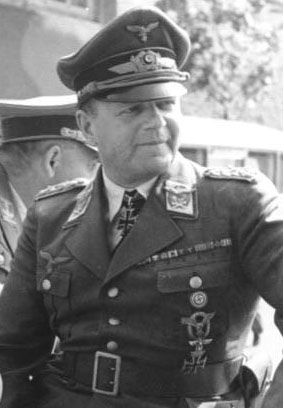Erhard Milch
Erhard Milch was a senior Luftwaffe officer who was promoted to the rank of Field Marshal during World War Two. He played an important role in the development of the Luftwaffe prior to 1939 and gave himself credit for it during the French and Norwegian invasions in 1940.
In 1921, Milch left the army and signed up with the aviation industry. He oversaw an airline which flew from Danzig to the Baltic states but it appeared a lot of small airlines within north Germany did not want many customers. Milch began working for Junkers Luftverkehr up to 1926, and became the director of the national German airline known as Deutsche Lufthansa.
Born in Wilhelmshaven in 1882, Milch became a member of the army as an artillery officer after his education. Milch initially served on the Western Front at the beginning of World War One; later in the war he moved to the German Army Air Service. He was a captain commanding Flight Squadron 6 by 1918.
Milch left the army in 1921 and started working in the aviation industry. In 1926 he became director of Deutsche Lufthansa, Germany's national airline.v

Germany was banned by the Treaty of Versailles from owning an air force. But many Germans thought that the terms of the Treaty were overly punitive. Germany clandestinely rearmed throughout the 1920s and 1930s. Milch secretly joined up with Hermann Goering to re-establish a German air force. Milch became Goering's deputy in 1933 - officially State Secretary in the Reich Aviation Ministry - so was tasked with managing armament production.
Milch’s career in Nazi Germany came under threat in 1935. Rumours circulated that Anton, his father, was Jewish. This was investigated by the Gestapo. The rumours only dissipated when Goering convinced Milch’s mother to sign an affidavit attesting that her husband was not Erhard’s real father. Milch was subsequently given a German Blood certificate.
Milch was given a promotion to the rank of Colonel General in 1938. The Luftwaffe was now feared across Europe after its role in the devastating bombing of Guernica in Spain. Milch and Goering received much credit for changing the Luftwaffe into a force to be reckoned with.
The Luftwaffe were significantly involved within the invasion of Poland in September 1939, which proved a success. Part of the Nazis Blitzkrieg tactic was pinpoint bombing by Stuka dive bombers, together with more intensive bombing by Dornier 17, Junkers 88's and Heinkell III's with the advancement of tanks and infantry. The Luftwaffe played an equally important role in the invasions of Norway and France. Off the back of these successes, Hitler gave Milch a promotion of Field Marshal.
But Milch’s position was far from secure. The Luftwaffe did not repeat its successes during Operation Barbarossa, Germany’s invasion of the USSR. The efficacy of the Luftwaffe’s leadership was questioned after the air force’s poor showing in the USSR and its inability to take Moscow. Milch joined Goebbels and Himmler in their suggestions to Hitler about Goering’s replacement. Hitler refused. Milch had made a powerful enemy in Goering. Goering forced Milch to step down as Director of Air Armament in June 1944, and instead Milch worked under the leadership of Albert Speer, Minister of Armaments.
As the war gradually came to an end, Milch made attempts to escape Germany and flee to the Baltic coast, which got him arrested in May 1945 and subsequently tried as a war criminal at Nuremberg. He was declared guilty there and received life imprisonment, but was released in 1954. He spent his remaining years in Düsseldorf.
Milch died on 25 January 1972.
See also: Field Marshal Bernard Montgomery
MLA Citation/Reference
"Erhard Milch". HistoryLearning.com. 2026. Web.
